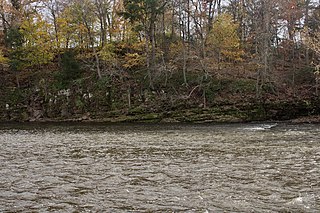
Rutgers University, officially Rutgers, The State University of New Jersey, is a public land-grant research university consisting of four campuses in New Jersey. Chartered in 1766, Rutgers was originally called Queen's College, affiliated with the Dutch Reformed Church. It is the eighth-oldest college in the United States, the second-oldest in New Jersey, and one of the nine U.S. colonial colleges that were chartered before the American Revolution. In 1825, Queen's College was renamed Rutgers College in honor of Colonel Henry Rutgers, whose substantial gift to the school had stabilized its finances during a period of uncertainty. For most of its existence, Rutgers was a private liberal arts college but it has evolved into a coeducational public research university after being designated The State University of New Jersey by the New Jersey Legislature via laws enacted in 1945 and 1956.

The Raritan River is a major river of New Jersey. Its watershed drains much of the mountainous area of the central part of the state, emptying into the Raritan Bay on the Atlantic Ocean.

"O Tannenbaum" is a German Christmas song. Based on a traditional folk song which was unrelated to Christmas, it became associated with the traditional Christmas tree by the middle of the 19th century and sung as a Christmas carol.

"Far Above Cayuga's Waters" is Cornell University's alma mater. The lyrics were written circa 1870 by roommates Archibald Croswell Weeks, and Wilmot Moses Smith, and set to the tune of "Annie Lisle", a popular 1857 ballad by H. S. Thompson about a heroine dying of tuberculosis.
The "Alma Mater" is the official school song of Dartmouth College, an Ivy League university located in Hanover, New Hampshire, United States. Composed by Harry Wellman, class of 1907, it was officially adopted by the College in 1926. The difficult to sing "Dartmouth Undying" replaced it in the fall of 1972, but the Alma Mater was restored as the official song in early 1973. Richard Hovey of the class of 1885 wrote the original lyrics in 1894, titling the song "Men of Dartmouth". Traditionally the original second verse was only sung during time of war. On May 28, 1988, Dartmouth changed the title and words to reflect the presence of women as part of the College, since Dartmouth had become coeducational in 1972. Nicole Sakowitz, Dartmouth Glee Club President was the first person to conduct the new Alma Mater.
Founded in 1872, the Rutgers University Glee Club (RUGC) is the eighth oldest Glee Club in the United States of America, a nationally recognized men's chorus based at Rutgers University, in New Brunswick, New Jersey. It is currently conducted by Dr. Patrick Gardner. Dr. Patrick Gardner has directed the group since 1994.

"Carmen Ohio" is the oldest school song still used by Ohio State University. The song was composed by freshman athlete and Men's Glee Club member Fred Cornell in 1902 or 1903. According to some accounts, he composed it on the train ride home from Ann Arbor, Michigan after Ohio State suffered an 86-0 loss to the Michigan Wolverines. The song was set to the tune of "Spanish Hymn", or "Spanish Chant", and the Men's Glee Club first performed it in 1903; however, it did not gain popularity until after its publication in The Lantern on October 10, 1906. At the following Ohio State-Michigan football game on October 20, 1906, "Carmen Ohio" was published in the program. In 1915, Cornell recalled that he wrote the song in 1903 at the request of the Men's Glee Club, and other family members later stated that the train story might be an exaggeration or outright fabrication. Currently, after every home football game in Ohio Stadium, win or lose, the football team and the crowd sing the first verse of Carmen Ohio, accompanied by The Ohio State University Marching Band. It is also sung by new graduates at the end of the university's commencement ceremonies, after diplomas are distributed.

The "Penn State Alma Mater" is the official alma mater of The Pennsylvania State University. The song was accepted by the university in 1901.
As one of the first nine colleges founded in the United States of America—founded as Queen's College in 1766 —Rutgers, The State University of New Jersey' has two-and-a-half centuries of tradition and heritage.

The Rutgers Scarlet Knights are the athletic teams that represent Rutgers University's New Brunswick campus. In sports, Rutgers is famously known for being the "Birthplace of College Football", hosting the first ever intercollegiate football game on November 6, 1869, in which Rutgers defeated a team from the College of New Jersey with a score of 6 runs to 4.
"The Good Old Song" is the de facto school song of the University of Virginia. It is often said to be the university's fight song, although the actual fight song is "The Cavalier Song". It is set to the music of "Auld Lang Syne", a song frequently sung on New Year's Eve.
"The Cavalier Song" is the University of Virginia's fight song. The song was a result of a contest held in 1923 by College Topics, the University's student newspaper. "The Cavalier Song," with lyrics by Lawrence Haywood Lee, Jr., and music by Virginia Glee Club member Fulton Lewis, Jr., was chosen as best fight song while John A. Morrow's "Virginia, Hail, All Hail" was chosen as the best alma mater song.
Brown University traditions hold that two songs, "Alma Mater" and "Ever True to Brown", are sung at public events and gatherings related to the university. The traditional alma mater song, "Old Brown," was created in 1860 and "Ever True to Brown", the second school fight song, was written by Donald Jackson. The song is played by the Brown Band at major varsity athletic events and at formal events such as Convocation and Commencement. An unofficial version offers humorous alternative lyrics.
"Bright College Years" is one of the traditional songs of Yale University, and the university's unofficial but undisputed alma mater. It was written in 1881 by Henry Durand and set to the tune of "Die Wacht am Rhein".

"Hail to Pitt" is the most traditional fight song of the University of Pittsburgh, which is commonly referred to as Pitt. The saying "Hail to Pitt!" is also the most traditional and commonly used slogan of the University of Pittsburgh and its athletics teams. The slogan is frequently used in promotional material, printed on merchandise and souvenirs. It was also the title of a 1982 history of Pitt athletics by author Jim O'Brien. The slogan is often used among alumni as a statement of affiliation, including as a closing signature in conversation or correspondence between alumni, and is sometime abbreviated as "HTP" or "H2P", the latter of which is a registered trademark of the university and is frequently used on official university signage and merchandise.

"Hark The Sound" is the alma mater (song) of the University of North Carolina. It was written by William Starr Myers, a member of the UNC Glee Club at the time. It is sung at the end of athletic events and other university gatherings, and is one of many alma maters set to the music of "Annie Lisle".

The alma mater of the University of Pittsburgh was adopted soon after the University changed its name in 1908 from the Western University of Pennsylvania to its current moniker. Lyrics were written by George M. P. Baird, class of 1909 and were set to the tune of what was then the Austrian National Anthem. A new tune for the "Alma Mater" hymn was composed by Charles W. Scovel, class of 1883, but it was not widely adopted and was either lost or became obscure.

The Ohio State University Men's Glee Club is an all-male choral ensemble at The Ohio State University. Officially founded in 1875, the Men's Glee Club is one of the oldest student organizations on Ohio State's campus and one of the oldest collegiate glee clubs in the United States. The group has garnered many accolades, most notably winning Choir of the World 1990 from the Llangollen International Musical Eisteddfod.
"Old Nassau" has been Princeton University's alma mater since 1859. Harlan Page Peck was the lyricist and Carl A. Langlotz was the composer. The lyrics were changed in 1987 to address sexism at the newly co-educational institution. For a brief time the song was sung to the melody of "Auld Lang Syne" before Langlotz wrote the music on demand. The lyrics were the result of a songwriting contest by the Nassau Literary Review.











